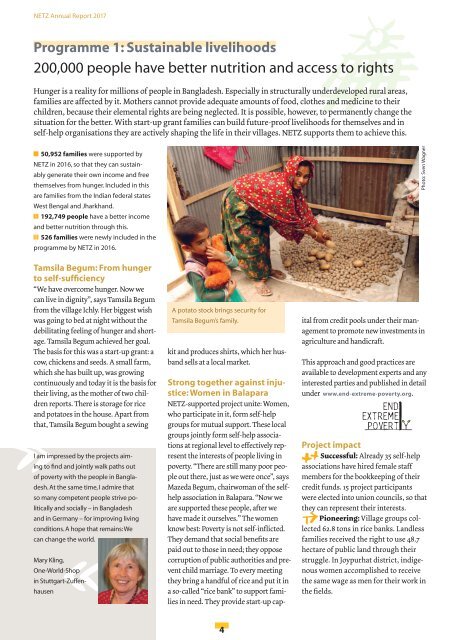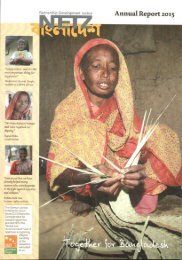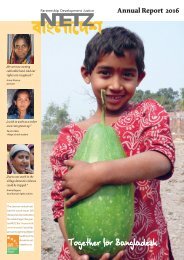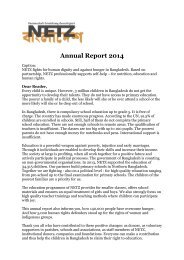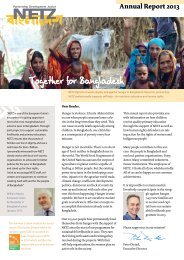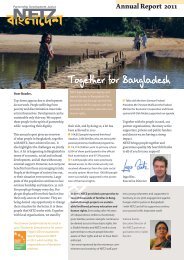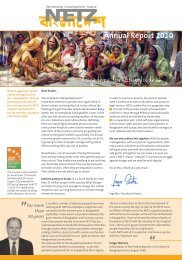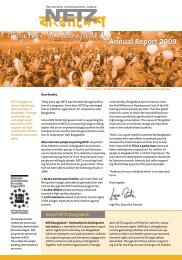NETZ Bangladesch Annual Report 2017
You also want an ePaper? Increase the reach of your titles
YUMPU automatically turns print PDFs into web optimized ePapers that Google loves.
<strong>NETZ</strong> <strong>Annual</strong> <strong>Report</strong> <strong>2017</strong><br />
V<br />
Programme 1: Sustainable livelihoods<br />
200,000 people have better nutrition and access to rights<br />
Hunger is a reality for millions of people in Bangladesh. Especially in structurally underdeveloped rural areas,<br />
families are affected by it. Mothers cannot provide adequate amounts of food, clothes and medicine to their<br />
children, because their elemental rights are being neglected. It is possible, however, to permanently change the<br />
situation for the better. With start-up grant families can build future-proof livelihoods for themselves and in<br />
self-help organisations they are actively shaping the life in their villages. <strong>NETZ</strong> supports them to achieve this.<br />
1 50,952 families were supported by<br />
<strong>NETZ</strong> in 2016, so that they can sustainably<br />
generate their own income and free<br />
themselves from hunger. Included in this<br />
are families from the Indian federal states<br />
West Bengal and Jharkhand.<br />
2 192,749 people have a better income<br />
and better nutrition through this.<br />
3 526 families were newly included in the<br />
programme by <strong>NETZ</strong> in 2016.<br />
Tamsila Begum: From hunger<br />
to self-sufficiency<br />
“We have overcome hunger. Now we<br />
can live in dignity”, says Tamsila Begum<br />
from the village Ichly. Her biggest wish<br />
was going to bed at night without the<br />
debilitating feeling of hunger and shortage.<br />
Tamsila Begum achieved her goal.<br />
The basis for this was a start-up grant: a<br />
cow, chickens and seeds. A small farm,<br />
which she has built up, was growing<br />
continuously and today it is the basis for<br />
their living, as the mother of two children<br />
reports. There is storage for rice<br />
and potatoes in the house. Apart from<br />
that, Tamsila Begum bought a sewing<br />
»I am impressed by the projects aiming<br />
to find and jointly walk paths out<br />
of poverty with the people in Bangladesh.<br />
At the same time, I admire that<br />
so many competent people strive politically<br />
and socially – in Bangladesh<br />
and in Germany – for improving living<br />
conditions. A hope that remains: We<br />
can change the world.<br />
Mary Kling,<br />
«<br />
One-World-Shop<br />
in Stuttgart-Zuffenhausen<br />
A potato stock brings security for<br />
Tamsila Begum’s family.<br />
kit and produces shirts, which her husband<br />
sells at a local market.<br />
Photo: Sven Wagner<br />
Strong together against injustice:<br />
Women in Balapara<br />
<strong>NETZ</strong>-supported project unite: Women,<br />
who participate in it, form self-help<br />
groups for mutual support. These local<br />
groups jointly form self-help associations<br />
at regional level to effectively represent<br />
the interests of people living in<br />
poverty. “There are still many poor people<br />
out there, just as we were once”, says<br />
Mazeda Begum, chairwoman of the selfhelp<br />
association in Balapara. “Now we<br />
are supported these people, after we<br />
have made it ourselves.” The women<br />
know best: Poverty is not self-inflicted.<br />
They demand that social benefits are<br />
paid out to those in need; they oppose<br />
corruption of public authorities and prevent<br />
child marriage. To every meeting<br />
they bring a handful of rice and put it in<br />
a so-called “rice bank” to support families<br />
in need. They provide start-up capital<br />
from credit pools under their management<br />
to promote new investments in<br />
agriculture and handicraft.<br />
This approach and good practices are<br />
available to development experts and any<br />
interested parties and published in detail<br />
under www.end-extreme-poverty.org.<br />
Project impact<br />
Successful: Already 35 self-help<br />
associations have hired female staff<br />
members for the bookkeeping of their<br />
credit funds. 15 project participants<br />
were elected into union councils, so that<br />
they can represent their interests.<br />
Pioneering: Village groups collected<br />
62.8 tons in rice banks. Landless<br />
families received the right to use 48.7<br />
hectare of public land through their<br />
struggle. In Joypurhat district, indigenous<br />
women accomplished to receive<br />
the same wage as men for their work in<br />
the fields.<br />
4


